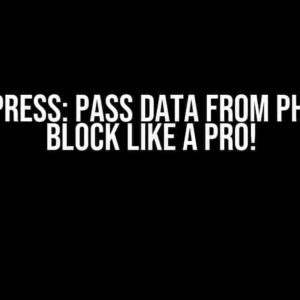Are you tired of dealing with pesky bots and spam submissions on your Angular application? Do you want to ensure that only genuine users can interact with your website? Look no further! Google reCAPTCHA v3 is here to save the day. In this article, we’ll take you by the hand and guide you through the process of integrating reCAPTCHA v3 in your Angular application.
- What is Google reCAPTCHA v3?
- Why Use reCAPTCHA v3 in Angular?
- Setting Up reCAPTCHA v3 in Angular
- Installing the reCAPTCHA Library
- Importing the reCAPTCHA Module
- Configuring reCAPTCHA
- Implementing reCAPTCHA in Your Form
- Handling reCAPTCHA Scores
- Server-Side Verification
- Common Issues and Solutions
- Conclusion
What is Google reCAPTCHA v3?
Google reCAPTCHA v3 is a powerful security tool that helps protect your website from spam and abuse. It’s an invisible captcha that uses machine learning to detect and block suspicious traffic. Unlike its predecessors, reCAPTCHA v3 doesn’t require users to solve puzzles or enter codes. Instead, it silently monitors user behavior and scores them based on their likelihood of being a human or a bot.
Why Use reCAPTCHA v3 in Angular?
reCAPTCHA v3 is an excellent choice for Angular applications because it:
- Provides an additional layer of security against spam and abuse
- Reduces the risk of fake accounts and credential stuffing attacks
- Improves the overall user experience by eliminating the need for puzzles and codes
- Is easy to integrate and customize to fit your application’s needs
Setting Up reCAPTCHA v3 in Angular
To get started with reCAPTCHA v3 in Angular, you’ll need to create a reCAPTCHA account and obtain a site key and secret key. Follow these steps:
-
Go to the reCAPTCHA dashboard and create a new site.
-
Choose the “reCAPTCHA v3” option and enter your website’s domain.
-
Copy the site key and secret key, you’ll need them later.
Installing the reCAPTCHA Library
To use reCAPTCHA v3 in your Angular application, you’ll need to install the `@ngx/captcha` library. Run the following command in your terminal:
npm install @ngx/captchaImporting the reCAPTCHA Module
In your Angular module, import the `RecaptchaModule` and add it to the imports array:
import { NgModule } from '@angular/core';
import { RecaptchaModule } from '@ngx/captcha';
@NgModule({
declarations: [AppComponent],
imports: [
BrowserModule,
RecaptchaModule
],
providers: [],
bootstrap: [AppComponent]
})
export class AppModule {}Configuring reCAPTCHA
Create a new component to handle reCAPTCHA configuration:
import { Component } from '@angular/core';
import { RecaptchaSettings } from '@ngx/captcha';
@Component({
selector: 'app-recaptcha',
template: ''
})
export class RecaptchaComponent {
siteKey = 'YOUR_SITE_KEY';
constructor(private recaptchaSettings: RecaptchaSettings) {
this.recaptchaSettings.setSiteKey(this.siteKey);
}
}Implementing reCAPTCHA in Your Form
Add the `recaptcha` directive to your form component:
<form>
<input type="text" placeholder="Username">
<input type="password" placeholder="Password">
<button type="submit">Login</button>
<recaptcha></recaptcha>
</form>Handling reCAPTCHA Scores
When the user submits the form, reCAPTCHA will return a score that indicates the likelihood of the user being a human or a bot. You can handle this score in your component:
import { Component } from '@angular/core';
import { RecaptchaService } from '@ngx/captcha';
@Component({
selector: 'app-login',
template: ''
})
export class LoginComponent {
constructor(private recaptchaService: RecaptchaService) {}
onSubmit() {
this.recaptchaService.execute('YOUR_SITE_KEY').subscribe((token) => {
// Send the token to your server for verification
this.verifyToken(token);
});
}
verifyToken(token: string) {
// Make a request to your server to verify the token
// and get the reCAPTCHA score
const score = 0.5; // Replace with the actual score from your server
if (score >= 0.5) {
// The user is likely human, proceed with the login process
console.log('User is human');
} else {
// The user is likely a bot, block the login attempt
console.log('User is bot');
}
}
}Server-Side Verification
On your server-side, you’ll need to verify the reCAPTCHA token and return the score to your Angular application. Here’s an example using Node.js and Express:
const express = require('express');
const app = express();
app.post('/verify-token', (req, res) => {
const token = req.body.token;
const secretKey = 'YOUR_SECRET_KEY';
const verifyUrl = `https://www.google.com/recaptcha/api/siteverify?secret=${secretKey}&response=${token}`;
axios.post(verifyUrl)
.then((response) => {
const score = response.data.score;
res.json({ score });
})
.catch((error) => {
res.status(500).json({ error: 'Failed to verify token' });
});
});Common Issues and Solutions
If you encounter any issues while implementing reCAPTCHA v3 in your Angular application, refer to the following troubleshooting guide:
| Issue | Solution |
|---|---|
| Error: “reCAPTCHA cannot be loaded in an iframe” | Make sure to add the `async defer` attributes to the reCAPTCHA script tag. |
| Error: “Unknown property ‘ executed’.” | Update the `@ngx/captcha` library to the latest version. |
| Error: “Failed to execute ‘postMessage’ on ‘DOMWindow’.” | Ensure that the reCAPTCHA script is loaded before the `execute` method is called. |
Conclusion
Integrating reCAPTCHA v3 in your Angular application is a straightforward process that can help you protect your website from spam and abuse. By following this guide, you’ll be able to implement reCAPTCHA v3 and start enjoying the benefits of improved security and a better user experience.
Remember to stay vigilant and keep an eye on your reCAPTCHA scores to ensure that your application remains secure and protected from malicious actors.
Happy coding!
Frequently Asked Question
Got stuck while handling Google reCAPTCHA v3 in your Angular project? Worry not, we’ve got you covered! Here are some frequently asked questions to help you out:
What is Google reCAPTCHA v3 and why do I need it in my Angular app?
Google reCAPTCHA v3 is a security feature that helps protect your website from spam and abusive traffic. It’s a great way to ensure that only humans interact with your app, and not bots or malicious scripts. In Angular, you’ll need to integrate reCAPTCHA v3 to prevent unwanted traffic and keep your app secure.
How do I set up Google reCAPTCHA v3 in my Angular project?
To set up reCAPTCHA v3 in your Angular project, you’ll need to create a site key and secret key on the Google reCAPTCHA dashboard. Then, install the @ng-recaptcha/core library using npm or yarn, and import the RecaptchaModule in your Angular module. Finally, add the reCAPTCHA component to your HTML template and configure it with your site key.
How do I handle reCAPTCHA v3 token verification in my Angular app?
To verify the reCAPTCHA token in your Angular app, you can use the execute method provided by the @ng-recaptcha/core library. This method returns a promise that resolves with a token, which you can then send to your server for verification. On your server, you can use the Google reCAPTCHA API to verify the token and ensure it’s valid.
Can I use reCAPTCHA v3 with Angular Universal?
Yes, you can use reCAPTCHA v3 with Angular Universal! Since reCAPTCHA v3 is a client-side library, it works seamlessly with Angular Universal, which renders your app on the server. Just make sure to configure your reCAPTCHA implementation to work with both client-side and server-side rendering.
How do I troubleshoot reCAPTCHA v3 issues in my Angular app?
If you’re experiencing issues with reCAPTCHA v3 in your Angular app, try checking the console logs for errors, validating your site key and secret key, and ensuring that the reCAPTCHA component is properly configured. You can also use the reCAPTCHA debugging tools to identify any issues with the token verification process.





